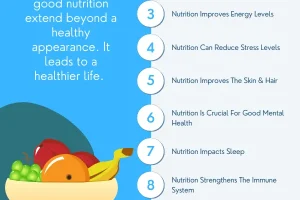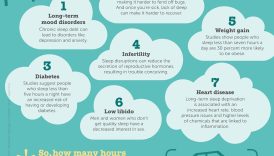Fuel Your Body Right: The Importance of Nutrition in a Healthy Lifestyle

Understanding Nutrition
Nutrition is more than just a buzzword; it’s the cornerstone of well-being and vitality. It’s fascinating how what we eat influences various aspects of our lives—energy levels, mood, and even our ability to fend off illness. Take a moment to think about the last meal you enjoyed. Did it make you feel invigorated or sluggish? Most likely, this experience gives you a glimpse into the profound effects of nutrition on your daily life. In essence, nutrition involves the substances that our bodies require for growth, metabolism, and other bodily functions. Here’s a quick overview to set the foundation:
- Fuel Your Body Right: The Importance of Nutrition in a Healthy Lifestyle
- Understanding Nutrition
- The Basics of Nutrition
- Macronutrients
- Micronutrients
- Importance of a Balanced Diet
- Health Benefits
- Nutritional Requirements
- Impact of Nutrition on Physical Health
- Impact of Nutrition on Mental Health
- Nutrition and Disease Prevention
- Fueling Your Body for Exercise
- Pre-Workout Nutrition
- Post-Workout Nutrition
- Macronutrients: These include carbohydrates, proteins, and fats. They provide the energy needed for daily activities and are essential for growth and development.
- Micronutrients: Vitamins and minerals fall into this category, playing vital roles in processes such as bone health and immune function.
To truly grasp the impact of nutrition, one must understand its intricacies. It’s not simply about eating healthy; it’s about nourishing the body in a balanced manner. With this groundwork laid, let’s delve into the basics of nutrition.
The Basics of Nutrition
Macronutrients
Now that we’ve laid the groundwork for understanding nutrition, let’s dive into the essentials: macronutrients and micronutrients. Starting with macronutrients, these are the substances that provide our bodies with the energy needed for daily activities. They can be broken down into three primary categories:
- Carbohydrates: Often viewed as the villain in many diets, carbs are actually crucial sources of energy. Think of fruits, vegetables, and whole grains that fuel your daily exercise and cognitive functions.
- Proteins: Essential for building and repairing tissues, proteins can be found in meat, fish, beans, and nuts. Your muscles will thank you for consuming enough protein each day.
- Fats: Often misunderstood, healthy fats—such as those from avocados and olive oil—support cellular health and help in the absorption of vitamins.
Micronutrients
On the other hand, we have micronutrients. Although they are needed in smaller quantities, they are no less important for maintaining health and well-being. These include vitamins and minerals that assist in various bodily functions. Here’s a quick glance at their role:
- Vitamins: These organic compounds, like Vitamin C and D, support immune function, skin health, and bone density.
- Minerals: Elements like calcium and iron are critical for processes such as bone formation and oxygen transport in the blood.
Understanding both macronutrients and micronutrients is essential for building a well-rounded diet. They work together in a symbiotic relationship, promoting overall health and vitality. With that said, let’s explore why maintaining a balanced diet is crucial.
Importance of a Balanced Diet
Health Benefits
Having explored the pillars of nutrition, it’s time to discuss why a balanced diet is paramount for overall health. A balanced diet doesn’t just mean eating less or cutting out entire food groups; it’s about creating a harmonious plate that includes all essential nutrients. The health benefits of achieving balance in your diet can be transformative. Personally, when I shifted to a more balanced approach, I noticed a surge in my energy levels and resilience to stress. Here are some key benefits of maintaining a balanced diet:
- Weight Management: A balanced intake helps regulate body weight, as it provides appropriate servings of macronutrients and prevents overeating.
- Improved Mood: Nutrient-rich foods can positively influence brain chemistry, leading to better mood stability and decreased anxiety levels.
- Enhanced Immunity: A diet rich in vitamins and minerals strengthens the immune system, making it easier for the body to fend off illnesses.
- Better Digestive Health: Foods high in fiber, like fruits and vegetables, promote a healthy gut and improve digestion.
Incorporating these elements consistently into daily meals fosters not just physical wellness but also emotional well-being. The next logical step is to delve into our specific nutritional requirements to maintain this balance.
Nutritional Requirements
Building on the importance of a balanced diet, it’s crucial to understand the specific nutritional requirements that cater to individual needs. Each person’s nutritional needs can vary based on factors such as age, gender, level of physical activity, and even health conditions. This individualized approach ensures that everyone can thrive. Here are some fundamental nutritional requirements to consider:
- Daily Caloric Intake: Depending on one’s activity level, adults generally need between 1,800 to 2,400 calories per day. Monitoring caloric intake can help with both energy levels and weight management.
- Macronutrient Distribution:Roughly, a balanced diet consists of:
- Carbohydrates: 45-65% of daily caloric intake
- Proteins: 10-35%
- Fats: 20-35%
- Vitamins and Minerals: Aim to incorporate various fruits and vegetables to cover your micronutrient needs. For instance, Vitamin D is essential for bone health, while iron is important for maintaining energy levels.
While these guidelines serve as a starting point, personalizing one’s diet based on nutritional requirements is the key to unlocking optimal health. Having established this important foundation, let’s now look at the direct impact of nutrition on physical health.
Impact of Nutrition on Physical Health
Transitioning from understanding nutritional requirements, it’s vital to recognize how nutrition significantly impacts physical health. What we consume plays a crucial role in shaping our bodies and their functions. This connection often becomes evident in everyday experiences, such as feeling sluggish after a heavy meal or energized after a salad. Here are some key ways nutrition influences physical health:
- Weight Management: A balanced diet helps maintain a healthy weight, reducing the risk of obesity-related diseases like diabetes and heart disease. Portion control and mindful eating can tremendously help in this aspect.
- Muscle Development and Recovery: Adequate protein intake supports muscle growth and repair, especially for those engaged in regular exercise. Consider incorporating lean meats, legumes, and dairy for optimal recovery.
- Bone Health: Nutrients like calcium and Vitamin D are essential for maintaining strong bones. Regular consumption of dairy products and leafy greens can fulfill these needs.
- Energy Levels: Carbohydrates provide the energy necessary for daily activities. Choosing whole grains and complex carbs can lead to sustained energy throughout the day.
Ultimately, understanding this impact highlights the importance of nourishing the body properly. With a clearer lens on physical health, let’s explore how nutrition also plays a vital role in mental health.
Impact of Nutrition on Mental Health
Following our exploration of how nutrition influences physical health, it’s equally important to acknowledge its profound effect on mental well-being. The food we eat can shape our thoughts, emotions, and overall mental health. Personally, I’ve found that my food choices can significantly impact my mood; after a week of eating junk food, I often feel more fatigued and irritable than usual. Here are some critical ways nutrition affects mental health:
- Mood Regulation: Nutrient-rich foods can help regulate neurotransmitters, the chemicals that transmit signals in the brain. For example, omega-3 fatty acids found in fish can boost serotonin levels, which is often dubbed the “happy hormone.”
- Cognitive Function: A diet high in antioxidants from fruits and vegetables can support brain health and improve memory. Berries, nuts, and green leafy vegetables are excellent choices in this regard.
- Stress Resilience: Proper nutrition can enhance the body’s ability to cope with stress. For instance, magnesium-rich foods like spinach and almonds help regulate cortisol levels, which can mitigate stress responses.
Recognizing this connection encourages individuals to consider their mental health when making dietary choices. With this understanding, it’s vital to explore how nutrition can also play a role in disease prevention.
Nutrition and Disease Prevention
Transitioning from the impact of nutrition on mental health, it’s essential to consider its crucial role in disease prevention. The food choices we make can serve as a formidable line of defense against various chronic diseases. Personally, I’ve witnessed how incorporating more nutritious options into my diet has helped me feel healthier overall and reduced my chances of falling ill. Here are some ways nutrition aids in disease prevention:
- Heart Health: A diet rich in whole grains, fruits, and leafy vegetables can lower cholesterol levels and reduce the risk of heart disease. Foods high in fiber, like oats and legumes, are particularly beneficial.
- Diabetes Management: Consuming low-glycemic index foods helps regulate blood sugar levels. This includes sweet potatoes, lentils, and berries, which can be helpful for those at risk of type 2 diabetes.
- Cancer Risk Reduction: Antioxidant-rich foods such as berries, nuts, and green tea can help reduce oxidative stress, potentially lowering the risk of certain cancers.
- Bone Health: Adequate calcium and Vitamin D intake from dairy products, leafy greens, and fatty fish play a critical role in preventing osteoporosis, particularly in older adults.
Recognizing these relationships empowers individuals to make healthier choices, leading to a better quality of life. With this proactive approach, it’s time to discuss how nutrition plays a key role in fueling the body for exercise.
Fueling Your Body for Exercise
Having explored how nutrition plays a pivotal role in disease prevention, let’s now focus on how it specifically supports exercise performance. Proper nutrition can significantly enhance both pre- and post-workout routines, ultimately leading to better results and improved recovery. Personally, I’ve found that when I pay attention to what I eat before and after exercising, my performance and recovery times improve dramatically.
Pre-Workout Nutrition
Eating the right foods before a workout is essential for optimal energy levels. Aim to nourish your body about 30 to 60 minutes before exercising. Here are some effective options:
- Carbohydrates: Foods like bananas, oatmeal, or whole-grain toast provide quick energy.
- Proteins: Including a small amount of protein can aid in muscle preservation. Opt for Greek yogurt or a protein smoothie.
- Hydration: Don’t forget to drink water; hydration is crucial for peak performance.
Post-Workout Nutrition
After your workout, your body needs the right nutrients to recover. Focus on rehydrating and replenishing energy stores. Ideal post-workout foods include:
- Protein: Grilled chicken, fish, or a protein shake helps repair and build muscle.
- Carbohydrates: Sweet potatoes or rice can refill glycogen stores, ensuring you’re ready for the next workout.
- Electrolytes: Foods high in potassium, like bananas or coconut water, help restore electrolyte balance.
By strategically planning both pre- and post-workout meals, individuals can enhance their exercise performance and recovery. This nutritional focus ultimately contributes to long-term fitness goals and overall health.





